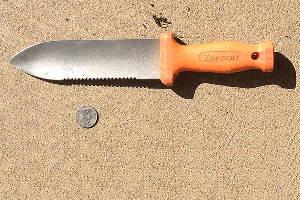Good tools make the work in my landscape much easier. I get the majority of my work done with just four tools.
Hori-Hori - Garden or Soil Knife
The tool that is absolutely indispensable to me is a Japanese gardener’s knife or hori-hori. It works better than a trowel or hand rake for digging, planting and weeding. And it’s great for dividing plants and planting bulbs.
It’s a simple tool, basically a blade and handle. One side of the blade is serrated and I use it to cut through perennial roots when I’m dividing plants or cut away the roots of a root-bound plant. The other side of the blade is smooth.
Some garden knives have a notched tip, called a dandelion fork, which is used to pop dandelions out of the ground. However, after trying several models myself, I prefer a knife without the notched tip. I find it gets in the way when I’m digging and gets snagged on roots, bits of mulch or other things in the ground. I prefer a knife with a solid pointed tip.
For a great review of several soil knife models and links where you can purchase them, take a look at The Garden Tool Review by Genevieve Schmidt.
Hand Pruners
For my birthday last year, I bought myself a really high quality pair of bypass hand pruners. They are a thing of beauty with wooden handles and carbon steel blades. I guess it’s official – I’m a garden nerd!
Bypass pruners are much preferred by serious gardeners because they are less damaging to plant stems than anvil-type pruners, which crush the stem as it is cut.

Long-handled Loppers
Hand pruners are best for making small cuts, on stems around ½ inch or less in width. Loppers should be used for medium sized branches ½ to about 1 ½ - 2 inches in width. (For anything larger than 1 ½ - 2 inches in width, you really should be using a handsaw.) Again, bypass loppers are preferred over anvil-types.
Loppers have a couple great advantages – the long arms make it easier to reach into the center of large plants and they give you better leverage for removing larger branches. Telescoping loppers have adjustable length handles, making them flexible for a variety of pruning jobs.
My next garden purchase will be ratcheting loppers. These allow you to perform a cut using several compressions of the handles. Each time the ratcheting mechanism maintains its grip as you reposition your hands or get a better grip.
Shovels
I use two types of shovel in my landscape – a standard round-headed shovel and a straight-blade tile spade. The pointed tip of the round-headed shovel makes it easier to dig into hard soil or dense organic matter (which is common in my zoysia grass lawn), while the straight-bladed tile spade works best for me to edge my landscaping beds. But I’m now looking at new shovel designs to try in my landscape – the Earth Talon and HERshovel.
The head of the Earth Talon shovel looks like a bear’s claw to me. It was awarded the Golden Shovel Award in 2015 by Gardening Products Review, as an outstanding new garden product. It features a two-inch pointed tip meant to focus your efforts and make digging in hard or rocky soil easier.
Another great alternative, especially to save wear and tear on women’s arms or wrists, is the HERshovel. The head of this shovel is a standard rounded-head, but it has a shorter handle and a large D-shaped grip, which allows gardeners to use both hands at once or any grip that is most comfortable.
Check it out the Shovels & Spades section of Gardening Products Review for pictures and details on both the Earth Talon and HERshovel.
Reference to commercial products or trade names is made with the understanding that no discrimination is intended and no endorsement by Nebraska Extension is implied. Use of commercial and trade names does not imply approval or constitute endorsement by Nebraska Extension. Nor does it imply discrimination against other similar products.

